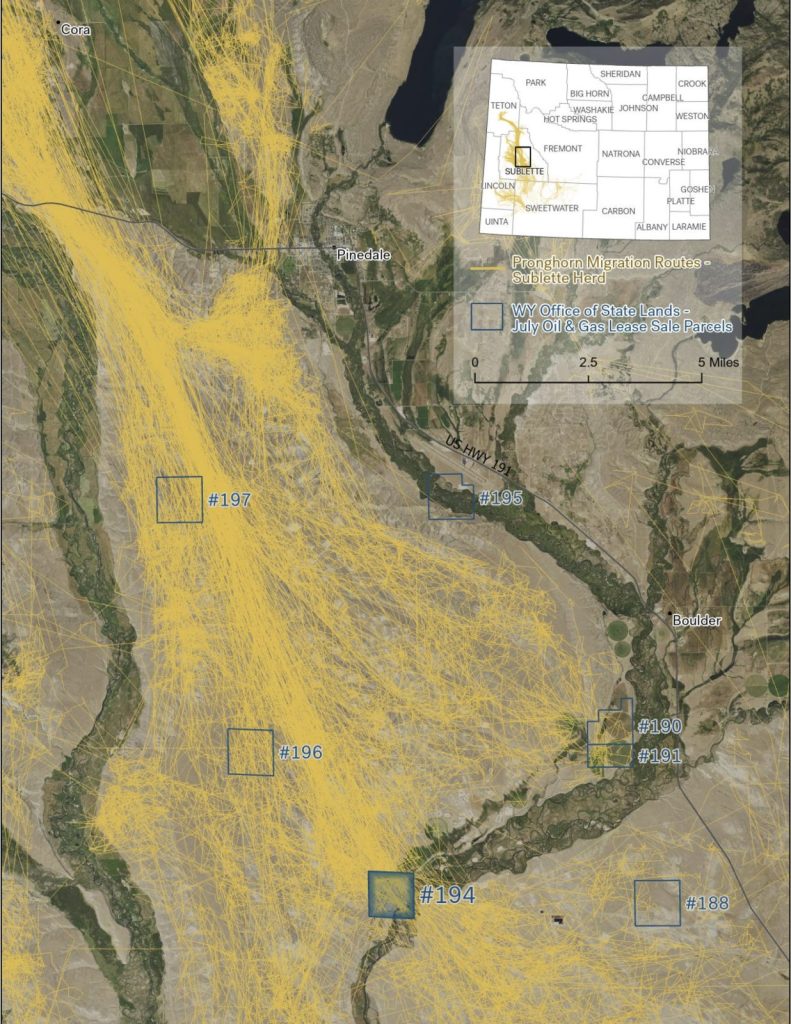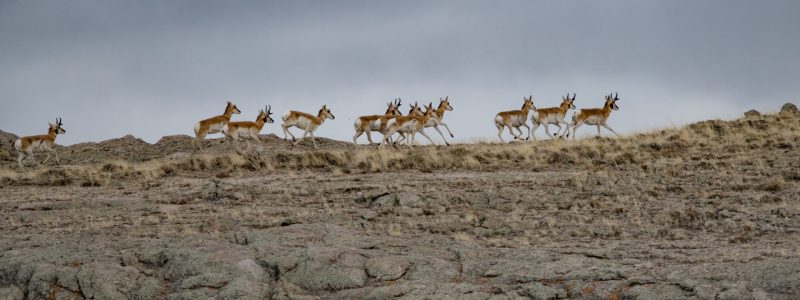DIRECTORS’ MESSAGES ON RECENT PARCEL 194 PRESS, PART 2: ON THE Ground
Recent press concerning the Wyoming Outdoor Council’s efforts to protect critical pronghorn migratory habitat has caused a bit of a stir in certain circles — and we’d like to set the record straight with an important message for the WOC community and other Wyomingites.
In this second part of a two-part message, WOC’s program director, Alec Underwood, responds to biased reporting and industry perspectives on WOC’s involvement in the July 2023 oil and gas lease sale, and lays out the need for reforms. If you haven’t already, be sure to read Part 1: On the Media, in which executive director Carl Fisher lays out this recent experience with the media in greater detail.
Setting the Record Straight on State Oil and Gas Leasing
There’s that common saying, that wildlife don’t know political or human-made boundaries. The complicated matrix of Wyoming land ownership can vex people, too — making it all the more important that we work together to build common-sense plans and policies to protect our uniquely Wyoming values.
Wyoming is not immune to major challenges for wildlife and occasionally, we see the threat of short-sighted development that warrants bold action to prevent it. Recent articles penned by Cowboy State Daily reporter Pat Maio paint a misleading picture of WOC’s involvement in state oil and gas lease sales, while taking as fact the lone perspective of industry. In an effort to provide transparency and factual information to the public, we at the Wyoming Outdoor Council would like to set the record straight.
Though we are not against oil and gas leasing or other forms of industrial development, most people can agree that some places are just too special to develop. That was the case with ‘parcel 194’ in the Office of State Lands and Investments’ July 2023 oil and gas lease sale. The 640-acre tract of land is located squarely in a bottleneck portion of the Sublette Pronghorn migration corridor, a pinch-point that is vital to the herd’s seasonal movements.
Many Wyomingites know the story of how nearly 50 percent of the Sublette herd perished during the winter of 2023 — dropping from an estimated 43,000 animals to 24,000. That’s why we were alarmed when the state offered a development lease directly in this incredibly sensitive habitat for pronghorn. After raising our concerns with state leadership, the auction went forward with parcel 194 included, and without any stipulations in place to protect migratory big game. Left with no other options and the threat of future development in this sensitive habitat, we decided to participate in the oil and gas lease auction.

We did not take this action lightly nor is it a standard practice for WOC. In our eyes, our bid was an effort to demonstrate that we could still produce revenue for our state while also preserving important wildlife habitat. It was not an effort to “drive up prices” or start a “bidding war,” as falsely mischaracterized in Cowboy State Daily’s articles. Regardless, we were not the high bidder for the parcel, and we turned our efforts toward the State Board of Land Commissioners, urging them not to issue the lease.
Despite having the support of both OSLI and the Wyoming Game and Fish Department for a new protective stipulation for the parcel, and hearing from hundreds of Wyomingites who wrote in opposition to leasing the ground in the first place, the Board issued the lease as-is — without any considerations for migratory pronghorn.
The story of parcel 194 represents a larger issue within the system of state trust lands: There is no clear alternative to protect key habitat or other values from development, while also respecting the mandate to provide revenue for state trust beneficiaries. Given there is great interest from the public in how state lands are used (think Casper Mountain or Munger Mountain), we hope our state leaders are listening and will commit to solving this very real problem.
The recent changes to defining “qualified bidders” in state oil and gas lease sales brings into question how the Board of Land Commissioners makes decisions on state lands leases. Take for example that according to testimony from OSLI in a February 2024 legislative committee hearing, only 27 percent of state land oil and gas leases ever make it to production. Does that sound like a system that is fulfilling the Board’s constitutional charge of optimizing revenue?
Also important to note, the Board has full discretion in their duty to protect and care for all state lands This includes the ability to withdraw lands to protect economic or environmental interests. In addition to what conservation groups may be willing to pay for protecting a parcel, what is the long-term value of protecting the most sensitive habitat for thousands of migrating pronghorn?
The Wyoming Outdoor Council has always been committed to finding common-sense solutions to any issue that we work on. That’s why we’ve been calling for increased screening for conservation conflicts before sensitive habitat is leased, as well as urging state leaders and OSLI to develop a formal conservation leasing program. We believe the state can, and should, do better to address these known conflicts with other values.
Oil and gas production on state lands is undoubtedly a primary driver of revenue for our schools and other public institutions, and we respect that. But that shouldn’t preclude us from discovering new avenues to conserve important habitat on state lands and monetize them for the beneficiaries in a sustainable manner.
Using a word recently penned to describe our advocacy, the real “shenanigans” being played are by those who, on occasion, would rather sell out our wildlife for short-term gains. Rest assured, we’ll keep seeking solutions and advocating for conservation of the things that make Wyoming such a special place. We invite anyone who cares about healthy landscapes, clean air, clean water, and wildlife to join us in those efforts.
Alec Underwood is the program director for the Wyoming Outdoor Council. He resides in Lander.
Banner Image: © Scott Copeland Images


